
Nov 30, 2017
In isolated rural areas across El Salvador, thousands of women work from their homes hand-embroidering intricate patterns on pieces of cloth they later return completed to factories to be sewn into finished garments.
 To meet the factory’s production deadlines, the women typically work 16 hours a day, seven days a week, and those who do not have electricity, embroider in the dark by candlelight. Often their children, who begin learning the craft at age seven, must assist them after school or even stay home from school to ensure their mothers complete the week’s work.
To meet the factory’s production deadlines, the women typically work 16 hours a day, seven days a week, and those who do not have electricity, embroider in the dark by candlelight. Often their children, who begin learning the craft at age seven, must assist them after school or even stay home from school to ensure their mothers complete the week’s work.
Yet they are paid less than poverty wages. The embroidery workers receive $2.25 per piece, which involves a day or a day and a half of constant work. Seventy cents of that payment goes to another craftswoman to add cording, and the employer deducts more if the final product is not perfect.
“Sometimes we spend the whole day or two days to earn $1 a day,” says Isela Evelia Beltran Palacios, a 17-year embroidery worker.
Not Even Poverty Wages
In a country where a living wage is $416 per month, in-home embroidery workers (bordadoras a domicilio) generally are paid between $55 and $80 a month. “Women who have been doing this work for 30 years have nothing,” says Beltran Palacios, speaking through an interpreter. “We don’t have pensions. Women get no vacation, no sick leave.”
Women who embroider at home also face repetitive motion injuries and suffer from eyestrain. “I have suffered a lot doing this job,” says another member of the SITRABORDO union, who has worked as an in-home embroiderer for 26 years. “I have severe headaches and vision problems from squinting at the work.” Most women cannot afford chairs or work tables, and spend their days on small plastic stools. Some women return to the stools days after giving birth because they must support their families, says the union member.
Together with the Association of Women Transforming (Asociación Mujeres Transformando), some 300 women have formed an embroiderers’ union, SITRABORDO, affiliated to FEASIES, a union federation and Solidarity Center partner. The women join the union at great personal risk. When employers learn the workers have attended a union meeting, they pull their contracts, often relocating to another town.
“Women have gone sobbing to the supervisor saying, ‘I have kids I need to feed,’ and the supervior says, ‘No’ (contract),” Beltran Palacios says. “They (employers) will go to another municipality and give the work to them.” Some of the women who have formed the union and lost contracts launched an embroidery cooperative as a pilot project to pool their resources and sell their goods directly to customers.
Local, International Campaign for Embroidery Workers’ Rights
FEASIES and SITRABORDO are pursuing a multi-pronged campaign in assisting embroidery workers to improve their working conditions. While maquila workers won a 29 percent wage increase last year and now are paid $295 a month, those in the informal economy, like the embroidery workers, are not protected by the minimum wage law, and are denied the right to safe workplaces, pensions, paid sick leave or paid vacations. FEASIES, which also represents maquila workers, tried unsuccessfully to include embroidery workers in last year’s wage increase.
So the unions are campaigning to change the country’s labor code to ensure informal economy workers have decent wages and working conditions, and are urging the government to sign on to International Labor Organization Convention 177 which sets labor standards for home-based workers.
They also are reaching out to retailers in the United States, where all the goods are sold. The campaign is focusing on retail chains because factories are locally owned and unlike big brands, are less responsive to international pressure, says Roberto Zaldaña, FEASIES secretary of international relations.
At the same time, Women Transforming is educating women about their rights. The organization holds trainings twice a month in the small towns where women embroider. Employers purposely target isolated areas for their embroidery contracts because women in these areas often do not know their rights, says Marilyn Sánchez, a lawyer and feminist activist with the organization. Women Transforming also brings together embroidery workers to discuss their concerns, where they often meet each other for the first time, creating a much-needed support network.
As part of the union’s international outreach, Beltran Palacios, Zaldaña, Sánchez and two other embroidery workers traveled to the United States recently, where they met with lawmakers, labor leaders and representatives from allied organizations in Washington, D.C., and New York.
Zaldaña says there is no collective bargaining agreement in the maquila sector because each time the union organizes a workplace, the factory closes. So his hope for the embroidery workers is for the government and employers to acknowledge the need to improve their working conditions.
“The most fundamental thing we want is dialogue for the embroiders,” he says.
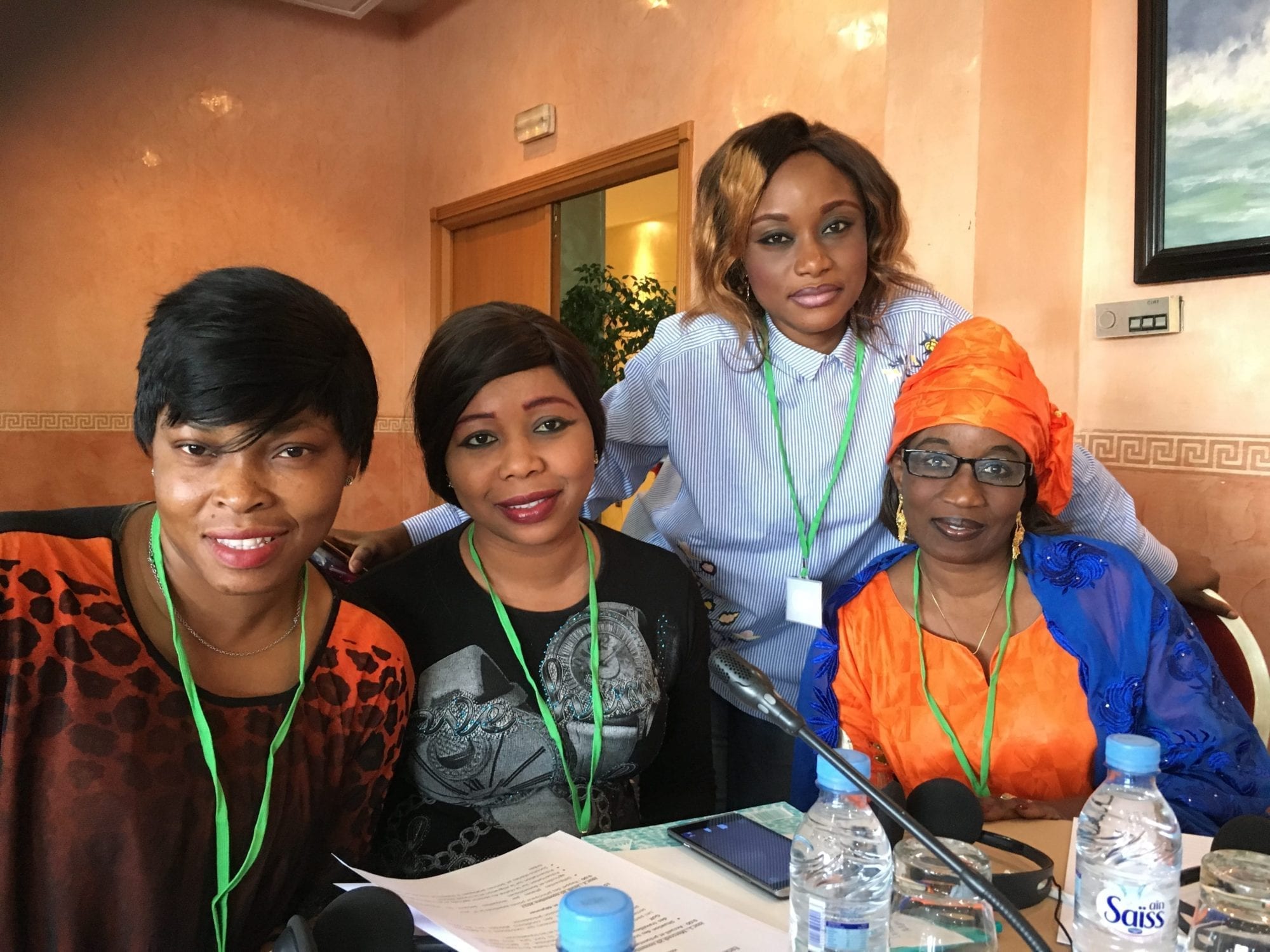
Nov 29, 2017
To promote the rights of women workers, especially women domestic workers and women farm workers, it is essential to seek solutions to build women’s capacity to defend their rights to equality, decent work and an end to violence and abuse, according to Hind Cherrouk, Solidarity Center director for North Africa as she opened a three-day forum in Casablanca, Morocco, this morning.
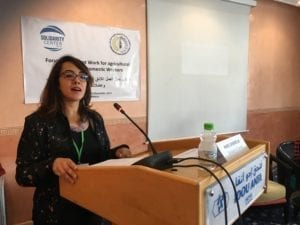
“This forum is an opportunity to build solidarity between women domestic workers and farm workers”–Hind Cherrouk, Solidarity Center program director for North Africa Credit: Solidarity Center/Tula Connell
“This forum is an opportunity to build solidarity between women domestic workers and farm workers,” says Cherrouk.
“We express our solidarity with our sisters who are migrants,” says Saida Bentahar. “We will always stretch our hands out to help them. We are going to remove the pressure of discrimination against our sisters wherever they are.” Bentahar, a Democratic Labor Confederation (CDT) women’s committee member, works to empower farm workers in Meknes El Hajeb, Morocco.
Some 30 worker rights advocates from countries that include Jordan, Kuwait, Lebanon and Morocco are meeting to discuss how such factors as gender, ethnicity and race are used to deny workers their rights and, ultimately, to build the connections and solidarity needed to take on the power structures that profit from their marginalization. The November 29–December 1 Forum on Decent Work for Agricultural Women and Domestic Workers is sponsored by the Solidarity Center and the CDT.
“If you don’t fight, nothing will happen,” says Elizabeth Tang, general secretary of the International Domestic Workers Federation. Tang, who spoke during the morning session, described how domestic workers around the world came together to fuel the 2011 passage of the International Labor Organization (ILO) Convention 189 on domestic workers, and later created IDWF.
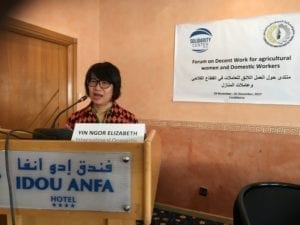
“If you don’t fight, nothing will happen”–Elizabeth Tang, IDWF secretary general Credit: Solidarity Center/Tula Connell
“If domestic workers stop fighting, then the convention will just be a nice looking paper,” says Tang. “So we decided to form a permanent union of domestic workers so we can keep fighting in unity so we can speak in one voice.” IDWF now includes 65 affiliated organizations in 53 countries.
More than half of the workers around the globe are not employed in the formal economy. Yet most informal economy workers, such as those cleaning houses and toiling on farms, have little access to decent work—which includes family-supporting wages, safe workplaces and social protections like paid time off and pensions. Decent work is one of the United Nation’s sustainable development goals, a series of targets the UN hopes to achieve by 2030.
Representing a range of unions and associations assisting workers throughout the Middle East and North Africa, participants described the challenges they face as domestic workers and agricultural workers and how, as worker rights activists, they are facilitating efforts through their organizations to achieve decent work.
Isolated in Homes, Domestic Workers Vulnerable to Abuse

Camara Hassanatou, a domestic worker in Morocco, described how her employer forced her to work without rest. Credit: Solidarity Center/Tula Connell
Of the more than 150 million migrant workers in the world, 11.5 million are migrant domestic workers. Primarily women, domestic workers provide essential support to families, cleaning homes, cooking meals and taking care of children. Yet their isolation makes them especially vulnerable to abuse and exploitation.
“I asked my employer how long I will work,” says Camara Hassanatou, an African migrant worker in Morocco. “ ‘You will work as long as I tell you,’ she said.” Hassanatou accepted the job because she needed to support herself. Yet she received no time off, even when she was ill.
Now an activist with the Coalition of Migrant Workers in Morocco (CTMM), Hassanatou joined participants in small group discussions in which domestic workers and farm workers shared their challenges. The women discussed how migrant domestic workers often are recruited by labor brokers who lie to them about the wages and working conditions in destination countries. After they are arrive in another country, their passports and mobile phones often are taken, trapping them in employment situations where they often face physical and sexual abuse, while forced to work long hours with no time off.
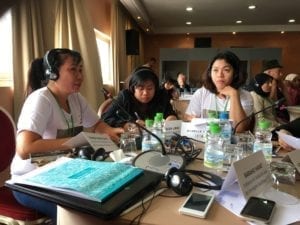
Former domestic workers from the Philippines were trafficked to Morocco and now are part of the Instance of Solidarity with Asian Workers. Credit: Solidarity Center/Tula Connell
Romaric Hocine, a member of the CTMM, which was formed in 2013, outlined how the organization works to educate migrant domestic workers about their rights. Under a recent legalization campaign by Morocco, migrant workers who have been employed for five years in the country, among other criteria, were eligible for amnesty if they applied in 2014 and 2015 and renewed in 2016. CTMM activists reached out to workers across the country to enable them to get formalize their status and attain basic rights.
Leadership training is central to the coalition’s work: “It is essential to develop leadership among migrant workers so they can defend their own rights,” he says.
From Kuwait, where two-thirds of its population is comprised of migrant workers, Mai al Tararwah, a lawyer with the Humanitarian Foundation for Legal Aid, described how a team of lawyers works to assist domestic workers and other migrants with legal support and vocational training. Farah Abdullah from the National Federation of Employees’ and Workers’ Unions in Lebanon (FENASOL) discussed the union’s objectives, which include creating “an independent structure for migrant domestic workers” in that country, where an estimated 250,000 migrant labor as domestic workers.
Farm Workers ‘Treated Like Slaves’
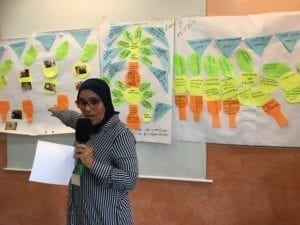
“Trade unions can reverse the factors that undermine vulnerable workers in society”–Saida Bentahar, a CDT women’s committee member Credit: Solidarity Center/Tula Connell
Many workers on agro-industrial complexes are seasonal employees and, like domestic workers in many countries around the world, they are not covered by national labor laws guaranteeing minimum wages and social protections like pensions and paid time off.
Rural women now contribute half of the world’s food and women in developing countries generate between 60 percent and 80 percent of the labor needed to produce food crops in developing countries.
Yet women working in agriculture “are being dismissed without pay, without severance, without justification with the stroke of the employer’s hand,” says Bentahar. “If they feel that the margins do not add up, employers will quickly lay off of women workers.”
Globalization has strengthened the negotiating hand of corporations at the head of supply chains. Faced with pressure to maximize profits, factory and farm managers typically pass on the costs and risks to the weakest links in the chain: the workers they employ.
Participants agreed that although domestic workers and farm workers may face different challenges, the common thread uniting their struggles is a lack of worker rights. But as Bentahar pointed out, unions provide a key path forward for many workers.
“Trade unions can reverse the factors that undermine vulnerable workers in society,” she says. “Our capital is our ablility to put pressure on our governments. We’d like your governments to put pressure on our governments to create momentum.”
“Things are changing,” says Tang. “You don’t have to look very far. Just look at yourselves.
“Together, we will make change.”
Stop back tomorrow for more coverage of the Forum on Decent Work for Agricultural Women and Domestic Workers.
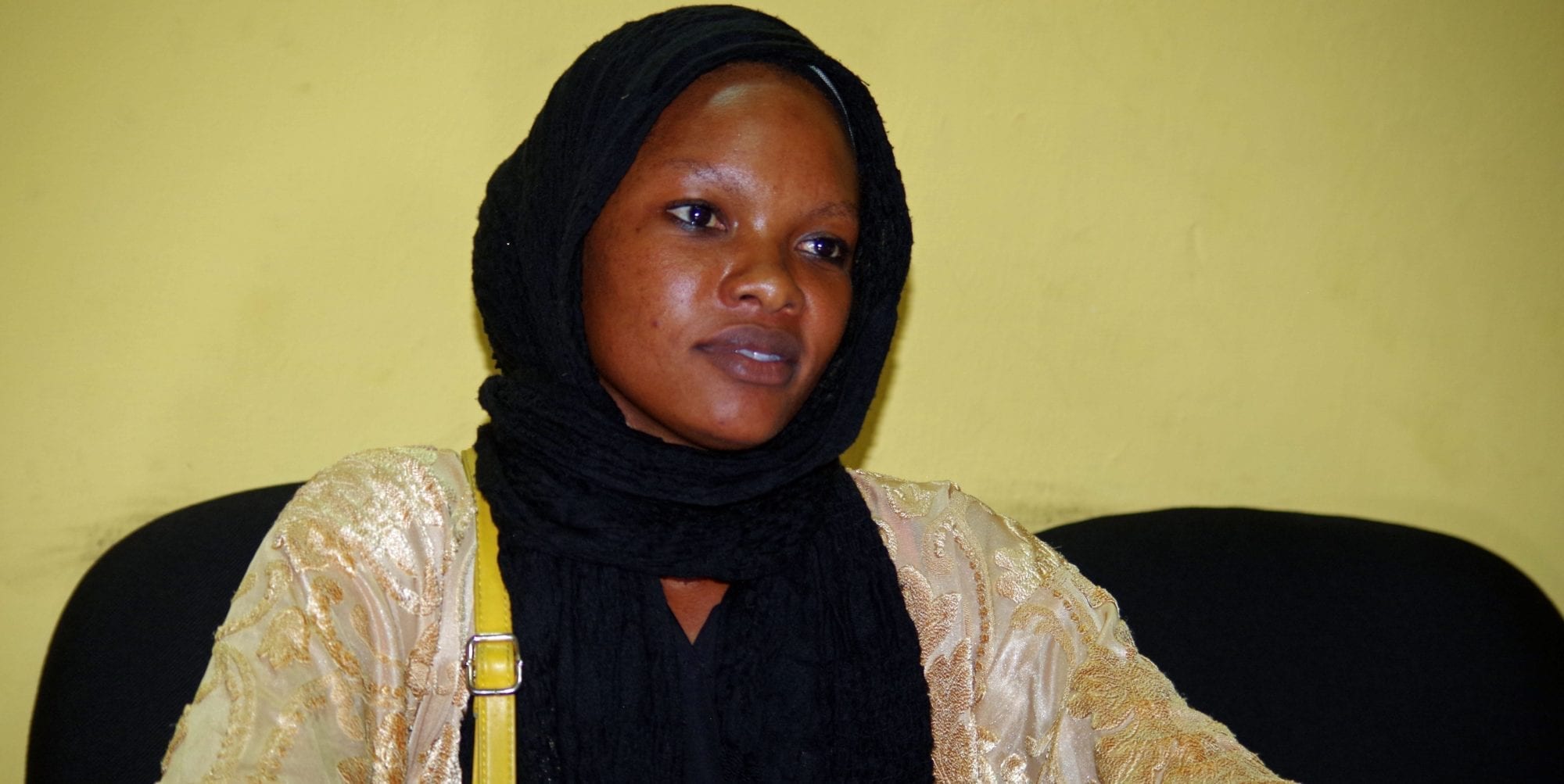
Nov 28, 2017
The Central Organization of Trade Unions–Kenya (COTU-K) said the country’s recent decision to lift its ban on workers migrating to Qatar and Saudi Arabia for jobs is “ill advised,” and urges the government to keep the ban in place until the Ministry of Labor provides a report that shows working conditions have improved.
“The ban was put in place after Kenyans suffered and many died in the Middle East,” says COTU-K Secretary General Francis Atwoli. Lifting the ban, which takes place at the end of November, will allow “Kenyans to be enslaved, tortured and killed in Gulf countries,” he says.
In 2014, Kenya banned some 930 recruiting agencies after reports of abuses, including murder, of Kenyan workers in the Middle East. Many Kenyans migrate for jobs, most employed as domestic workers and construction workers, because they are unable to find jobs at home.
Recent Solidarity Center interviews with Kenyans who had returned from jobs as domestic workers in Saudi Arabia highlight the brutal treatment they receive by employers, who force them to work without breaks day and night and often beat them and sexually assault them. Many, like Mwahamisi Josiah Makori, return home unpaid after months of abuse.
Together with the Solidarity Center, the Kenya Union of Domestic, Hotel, Educational Institutions, Hospitals and Allied Workers (KUDHEIHA) is reaching out to communities in the Mombasa area with a series of forums on migrant workers’ rights. Unscrupulous labor brokers promise workers higher wages than what they will be paid, describe working conditions far less grueling than reality, and do not show workers their contracts until they are at the airport or bus station. Frequently, the contracts are written in Arabic or a language the workers cannot understand, and the contracts may even change after they arrive at their destinations.
“The majority of African countries have banned their citizens from working in these Gulf countries,” says Atwoli. “Kenya should follow suit.”
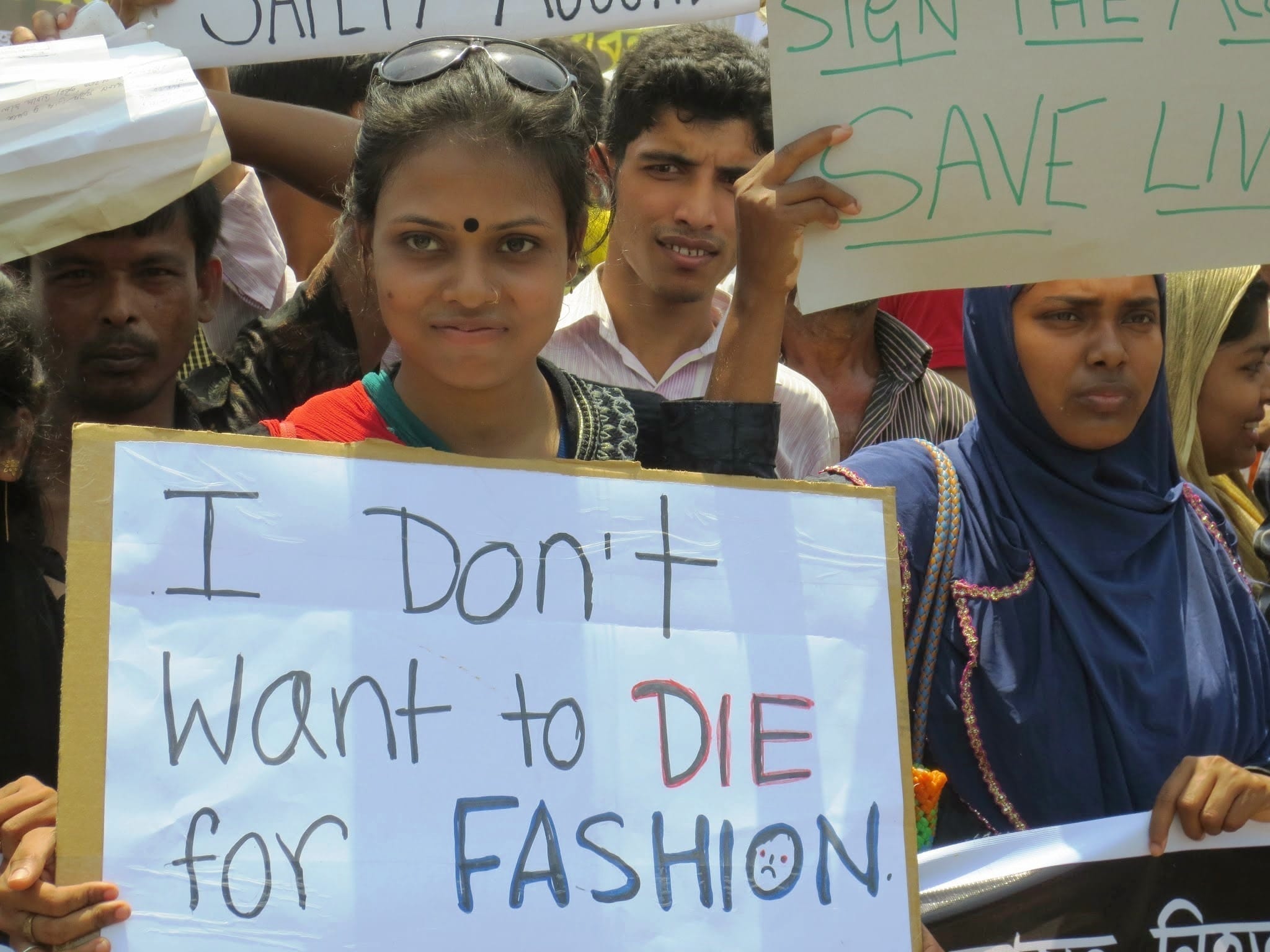
Nov 24, 2017
Five years is a lifetime in the fashion industry. The fast fashion cycle demands quicker and quicker turnarounds, sometimes in months or even weeks. This puts downward pressure on suppliers in terms of prices for the goods they produce and increases demands on workers, usually to work more for less. The last five years in the Bangladesh garment industry have been particularly dizzying, following the deadly November 24, 2012, Tazreen Fashions fire—and the Rana Plaza collapse six months after—that impelled intense, though not-quite permanent changes.
For workers and their unions, some changes have been historic and empowering. In an unprecedented burst of organizing in 40 years of the garment industry in Bangladesh, more than 400 unions recruited 90,000 new members. Now, however, we are seeing the government’s and industry’s reactions to that empowerment. Their dismissive attitude toward workers, their rights and their role in a booming sector runs the risk of harming not only Bangladesh garment workers but the very trade deals that make the country’s garment and textile sector its economic engine.
The young women union leaders of Bangladesh have surged forward against difficult odds, and the scars of the Tazreen factory fire that killed 112 garment workers are still raw. Many workers who were badly injured in the disaster, as documented by the Solidarity Center, are still unable to work. And the unions that workers continue to organize are facing an uphill battle for recognition, dignity and rights at work.
In 2012, prior to Tazreen, 12 unions applied for registration, a government requirement, and only one received it. Following Tazreen and with the world focused on how our clothes are made, 157 unions applied for registration and 84 were registered in 2013. Through their unions, the mostly woman workforce learned fire safety, gained maternity benefits and even improved their wages. But a backlash began to set in by 2015. Intimidated by employers determined to limit organizations that would represent worker interests, workers formed fewer unions.
Last December widespread labor unrest over poor wages in Ashulia, a suburb of Dhaka, led to hundreds of fired workers, police repression and trumped-up legal charges against worker rights activists. In response many Western clothing brands boycotted the annual high-profile “garment summit” in February, organized by the Bangladesh Garment Manufacturers and Exporters Association (BGMEA). In the spring the European Union (EU) held a first-ever meeting in Dhaka to discuss Bangladesh’s ill-treatment of workers and disregard for freedom of association in light of the garment industry’s preferential trade status. Still not getting the message, the Bangladesh police surveilled union activists, temporarily shut down union offices and raided worker education programs supported by the U.S. government, while ignoring coordinated attacks, verbal and otherwise, on labor organizers.
The events of the past year are building to a moment of truth for the government of Bangladesh and its garment sector. Bangladesh lost its preferential tariff benefits under the U.S. Generalized System of Preferences (GSP) in 2013, when the U.S. Trade Representative suspended it from the program. The EU has a similar tariff program and has demanded significant changes, to be unveiled this month, in Bangladesh’s labor law and practice in order to keep those benefits.
In a new white paper, the Clean Clothes Campaign, European Trade Union Confederation, International Trade Union Confederation and the IndustriALL and UNI global unions provide clear evidence that, despite signing a sustainability compact with the EU a year after the Tazreen fire, Bangladesh remains in violation of the deal. In the compact, the government pledged to reform labor laws, implement freedom of association in export-processing zones, improve union registration and curtail anti-union discrimination.
International Trade Union Confederation General Secretary Sharan Burrow says, “The government of Bangladesh is consistently failing to meet its obligations under international law to protect workers’ rights. The result is continued exploitation and poverty wages for workers in the garment industry. An EU investigation would help break the stranglehold that factory owners in Bangladesh have over the parliament and government, and would provide vital support for workers and their families.”
The EU has an important choice to make: whether to accept more empty promises from the Bangladesh government or institute a review of GSP trade benefits, the report’s authors say.
“Despite promises made, it is still extremely difficult for workers in Bangladesh to exercise their fundamental labor rights,” says Jenny Holdcroft, IndustriALL assistant general secretary. “The continued failure of the Bangladeshi government to take the necessary action to protect workers’ rights is ample reason for the EU to launch the much-needed trade investigation.” Bangladesh’s powerful employers and government have demonstrated little interest in changing the status quo, but a day of reckoning may be upon them. They can grant workers the respect and rights they deserve, or they can risk their flagship industry and economy. After five years, garment workers familiar with fast fashion are counting on eventual justice.
This is a crosspost from Thompson-Reuters.

Nov 20, 2017
A group of armed civilians calling themselves the “Tonalapa Community Police,” attacked striking workers at the Media Luna gold mine in Mexico on November 18, killing two workers. The two men killed were brothers, Víctor and Marcelino Sahuanitla Peña.
Workers at the Cocula, Guerrero, gold mine went on strike earlier this month after their employer recognized the Confederation of Workers of Mexico (CTM) union, a labor organization with a history of acting as “protection union” by assisting employers in blocking independent unionization efforts. The independent mineworkers’ union, SNTMMSSRM (Los Mineros), had filed for a union election on October 13.
On November 16 and 17, union leaders and the employer negotiated a peaceful resolution which called for the withdrawal of armed security forces and an expedited union representation election. The talks came after scores of armed police forces arrived at the mine, taking over the site on November 13.
“This is an outrageous and unacceptable attack on freedom of association and fundamental human rights,” says Solidarity Center Executive Director Shawna Bader-Blau. “The perpetrators must be found and held accountable.
“We stand with Los Mineros and workers everywhere who seek to peacefully form unions of their choosing,” she says.
Workers say an army squadron detained the attackers, some of whom they identified as CTM leaders, but immediately released them. The government has now sent in armed security forces.
In a statement, the United Steelworkers in Canada urged the Canadian government to “intervene with Mexican authorities and the company to recognize the basic rights of Mexican workers and prevent further violence.”
Canada-based Torex Gold Resources owns the Media Luna mine.

 To meet the factory’s production deadlines, the women typically work 16 hours a day, seven days a week, and those who do not have electricity, embroider in the dark by candlelight. Often their children, who begin learning the craft at age seven, must assist them after school or even stay home from school to ensure their mothers complete the week’s work.
To meet the factory’s production deadlines, the women typically work 16 hours a day, seven days a week, and those who do not have electricity, embroider in the dark by candlelight. Often their children, who begin learning the craft at age seven, must assist them after school or even stay home from school to ensure their mothers complete the week’s work.








